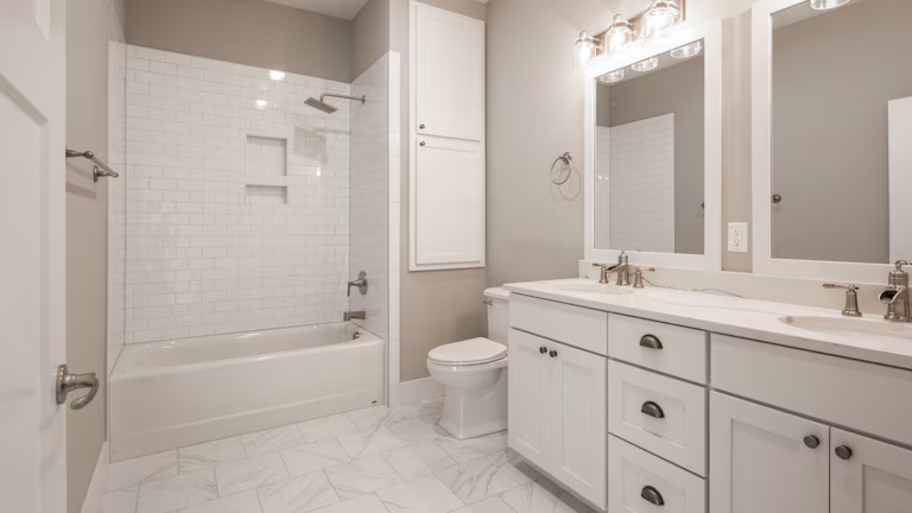
Forget the spa. Steam showers bring the luxury right into your home. This guide will help you budget steam shower costs—no matter the specs.
Wash away your worries about finding the best bathroom contractor


From choosing new bathroom tiles to deliberating over the hottest trends in bathtubs, renovating your bathroom is the ultimate dream project. There are also plenty of ways to lower the stress of a bathroom renovation, but finding the right pro to hire for a bathroom remodel tops the list.
Bathroom contractors are your best option as they specialize in areas from tiling to plumbing to ventilation. During your research, you may find companies marketed as kitchen and bathroom remodelers, as the processes require similar knowledge. To hire the best bathroom remodeling contractors, you'll want to perform thorough research and craft a strategic plan.
Do your research before diving into a remodeling project. Reach out to as many different types of people as you can, from contractors to remodeling companies, to be as informed as possible on all the modern remodeling options available to you.
Having a contractor to handle your project from start to finish reduces the potential for hitches and headaches. Some benefits of hiring a contractor for a bathroom remodel include:
Expert advice: Not sure what the most practical bathroom layout is? A contractor can suggest the best place for your toilet and sink, along with ideas for design elements.
Flawless finish: No need to worry about crooked cabinets or untidy tiling. Reputable professionals guarantee quality, long-lasting work.
Safety: A bathroom remodeling contractor often has licensed local plumbers and electricians on their team or gets discounted rates from these trades. Any pipework or electrical rewiring repositioning will be safe and up to code.
Efficiency: DIY bathroom remodels take time. You could be working on it for weeks if you’re trying to complete the job over evenings and weekends. Contractors put in full days and tackle the tasks more quickly and efficiently.
Handles permits: Professionals know when you need a permit and are up to date on building codes for structural or plumbing changes. They can help you handle the often complex application process, too.
Peace of mind: You won’t have to worry about costly DIY disasters, like hidden leaks or botched tiling. Hiring a pro takes the stress out of this complex remodeling project.
We don’t recommend DIY remodeling your bathroom. This demanding project requires time, patience, and high skill levels across carpentry, plumbing, waterproofing, and more.
If you’re undertaking a full bathroom remodel, especially if it involves major layout, structural, or plumbing changes, you’ll need to hire a bathroom remodeling contractor near you. Even if you’re comfortable with DIY, you shouldn’t attempt complex rewiring or replumbing work. Hiring a pro makes your bathroom remodel stress-free.
To save some money, the average DIYer can complete some refreshing tasks in lieu of a remodel, like applying a lick of paint, replacing hardware, and installing a new vanity unit or lighting.

It's important to get a few ducks in a row—your budget, a timeline, and other project parameters—before contacting prospective contractors for the first time.
Know your scope: Whether you’re gutting your entire bathroom or just updating some fixtures will determine the kind of pro you need.
Have a plan for your project: Be specific about what you want and set an achievable budget.
Check qualifications and references: Contact at least three contractors and schedule an in-person walkthrough for an estimate.
The standard cost to remodel a bathroom ranges from $5,600 to $16,900. Budgets vary widely depending on your space's size, the extent of the remodel, the finishes, and how much work you tackle yourself. You might spend $500 upgrading hardware, installing new lighting, and repainting the room yourself.
The cost of a small bathroom remodel could range from $1,500 to $15,000, with an average cost of $6,500. However, hiring a contractor for a major spa-like renovation of a primary bathroom involving retiling, replacing fixtures, and high-end materials could cost up to $30,000.
| Type of Bathroom Remodel | Average Cost Range |
|---|---|
| Half bath or powder room | $1,500–$15,000 |
| Guest bathroom | $5,600–$20,000 |
| Primary bathroom | $8,400–$30,000 |
From average costs to expert advice, get all the answers you need to get your job done.

Forget the spa. Steam showers bring the luxury right into your home. This guide will help you budget steam shower costs—no matter the specs.

The cost to demo a bathroom depends on its size, complexity, extent of the demo, and whether you DIY or not. This guide will help you budget effectively.

Curious how much a shower remodel costs? From new fixtures to full installations, we have the prices you need to know to establish a shower remodel budget.

Adding kitchen cabinets to your ceiling is a budget-friendly way to increase your storage space and make your kitchen look more attractive.

Small bathroom remodel costs depend on a number of factors—like what exactly you’re upgrading and the size of the room. This guide will help you budget.

Discover how to dispose of old countertops, including removing, recycling, and donating. Our expert guide has all the info for DIYing or hiring a pro.